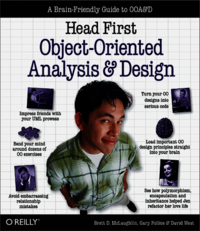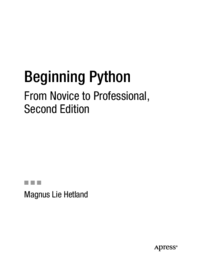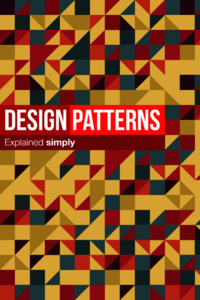Etiqueta "Object Oriented Design"
Se han encontrado 3 Coincidencias
Head-First Object Oriented Analysis & Design
141 Visitas | 259 Descargas | 2013-10-03 13:37:26 | efirvida
This is a refreaching look at the subject of OOA&D. There are many books on the market that spend a lot of time telling you why, but do not actually enable the practitioner to star work on a project.

Beginning Python From Novice to Professional, Second Edition
Programación en Lenguaje Python
240 Visitas | 316 Descargas | 2013-11-25 05:05:39 | abelm
Este es un libro excelente para aprender a programar en python, y finalmente para hacer cosas extraordinarias también. A diferencia de otros libros dedica sus primeros 4 capítulos a: cuestiones básicas como la instalación en GNU/Linux y Windows, Listas y Tuplas, Strings y Diccionarios. Luego analiza los flujos, Funciones, Recursividad, Herencia, Manejo de Excepciones, entre otros. En una virtual tercera agrupación a partir del capítulo 11 analiza el trabajo con ficheros, Interfaces Gráficas, Soporte a Bases de Datos, Programación para Redes de Datos, Aplicaciones Web y Testing. A partir del capítulo 17, ya más avanzado, se pueden encontrar códigos muy bien documentados de como extender el lenguaje, empaquetar tus programas, programar parsers para HTML, XML, crear estructuras de comunicación como XML.RPC,....

Design patterns explained simply
Patrones de diseño de software
112 Visitas | 49 Descargas | 2021-12-31 04:44:44 | josedaniel
This book isn't an introduction to object-oriented technology or design. Many books already do a good job of that. This isn't an advanced treatise either. It's a book of design patterns that describe simple and elegant solutions to specific problems in object-oriented software design. Once you understand the design patterns and have had an "Aha!" (and not just a "Huh?" experience with them, you won't ever think about object-oriented design in the same way. You'll have insights that can make your own designs more flexible, modular, reusable, and understandable - which is why you're interested in object-oriented technology in the first place, right?
Contribuir
Usted puede contribuir con Libros UCLV, es importante para nosotros su aporte..
Contribuir